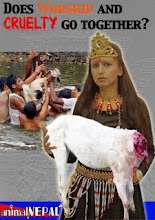
Birgunj/Kathmandu, November 26, 2009 – Animal campaigners are ‘deeply upset and traumatized’ by the mass sacrifices that took place at Gadhimai temple on Tuesday and Wednesday. ‘The organizers have violated every single code of animal welfare. Despite worldwide protests they have not introduced a single measure to alleviate the tremendous suffering of the thousands of animals involved’, says spokesperson Manoj Gautam.
A team of campaigners from the Animal Welfare Network Nepal and Anti-Animal Sacrifice Alliance returned to the capital last night. According to the team the public beheading of some 16.000 water buffaloes ranks ‘among the worst examples of animal cruelty in the world’.
The Gadhimai committee, despite countless promises, failed to provide a space where animals could be left for jeevandhan, giving the animals a new leash of life.
The team notes that none of the suggestions made by the Department of Livestock or animal welfare groups have been taken seriously by the organizers. Most animals were imported illegally from India; none was checked by quarantine officers. The animals were transported in haphazard conditions and they were not fed or watered before the sacrifice. During the killing the animals were left untethered and the organization did not issue instructions for the sharpening of knives, leading to even more unnecessary suffering. The animals were forced to witness the killing of countless other animals before their turn came, including the killing of mother animals in front of their siblings. Also, there were no facilities for the drainage of blood or the timely removal of dead bodies.
Manoj Gautam: ‘The animals were not provided with any water and food in the days before the sacrifice. Many young animals had in fact already died from stress, exhaustion and dehydration before the killings started. Their bodies were left among the live animals.’
The organizers failed to issue rules for the general sacrifices that were carried out randomly in a radius of 3 kilometer of the temple. ‘Everyone could kill anything, with whatever knife or sword. Many animals died an unbearable slow and violent death because the knives were not sharpened properly and the butchers were inexperienced.’
Up to an hour before the public killings of buffaloes started, campaigners tried to convince the organizers to cancel the public killing of water buffaloes and instead pierce their ears to let some blood flow.
According to the campaigners the ‘buffalo carnage’ was a traumatizing event for any sensitive person. Manoj Gautam: ‘Thousands of buffaloes were standing in an enclosure when butchers holding swords started hacking randomly at the animals. Some heads could be severed in one cut; in other cases it took the butchers a long time to kill the buffalo. No one was holding the animals – many tried to escape. Baby buffaloes were bleating and searching for their mothers. Soon they were walking around in a pool of blood. They were hunted down by the butchers. Needless to say, not a single animal survived the blood bath. After witnessing the suffering inflicted on these gentle, loyal animals, I feel deeply upset and ashamed of the people of my country involved in the whole event.’
Countless children bore witness to the inhumane public sacrifices. This shows that the organizers and the State have violated Nepal’s commitments towards ensuring Child Rights.
According to the campaigners the festival is being promoted as a ‘spectacle’ and a cultural event that enriches Nepalese culture. ‘The truth is that Gadhimai legitimizes violence against the innocent. The priests make the devotees believe that their wish will only come true when offering an expensive buffalo, goat or other kind of animal. The Maoist-led organizing committee, instead of abolishing these outdated beliefs promotes them to increase voting banks and to collect even more revenues.’
According to the team not only the organizers but the government at large should be held responsible for the Gadhimai killings. ‘Not a single government leader has had the courage to speak out against the mass sacrifices. What kind of leader in this time and age wants to perpetuate rituals that promote superstition, drain the resources of the poor and destroy the image of Nepal as an attractive destination?’
-low+reso.jpg)













